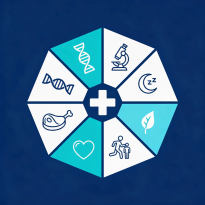5 Powerful Traits of Vesicotonia in Eight Constitution Medicine
In the system of 8 Constitution Medicine, Vesicotonia represents a body type with a strong Water energy (Kidney system) and the weakest Earth energy (Spleen and Stomach). This constitution closely matches the Lesser Yin person from traditional Eastern medicine typologies. Vesicotonia types are especially vulnerable to issues stemming from digestive weakness. However, when their digestion is well cared for, they often enjoy better long-term health and resilience than most other constitutions.
1. Organ Energy Order: Vesicotonia’s Internal Hierarchy
The internal energy order for Vesicotonia is:
- Strongest: Kidney (Bladder)
- Strong: Liver (Gallbladder)
- Moderate: Heart (Small Intestine)
- Weak: Lung (Large Intestine)
- Weakest: Spleen and Stomach
This hierarchy shows that the digestive organs are the most fragile in this constitution. The respiratory system is also sensitive and prone to weakness. Thus, strengthening the stomach becomes the top health priority.
2. Cold and Raw Foods Are Especially Harmful
Because of their cold internal constitution, Vesicotonia individuals should avoid:
- Raw salads
- Iced drinks
- Cold fruits
- Ice cream or frozen desserts
Cold exposure in the digestive tract further reduces stomach energy, often triggering:
- Indigestion
- Bloating
- Abdominal pain
- Loss of appetite
- Weakened immune response
Consistent exposure to cold food or environments may even lead to gastric ptosis (downward displacement of the stomach).

3. Warm and Light Eating is the Healing Foundation
Vesicotonia types thrive on small, warm, and easily digestible meals. Important eating habits include:
- Eating slowly and mindfully
- Having smaller portions more frequently
- Keeping the eating environment warm and calm
- Avoiding eating when emotionally upset or overly fatigued
Ideal meals include warm rice porridge, lightly cooked vegetables, clear soups, and herbal teas.
4. Weak Digestion, Weak Body
In traditional Eastern medicine, the stomach and spleen are responsible for postnatal energy production—the energy we gain from food. If the digestive organs are weak, all other organs eventually suffer. When Vesicotonia digestion is weak, symptoms may include:
- Cold hands and feet
- Frequent minor colds or infections
- Brain fog or fatigue after eating
- Slow recovery from illness
- Mood swings and lowered motivation
Supporting the digestive fire with warmth, routine, and emotional calm is key.
5. A Strong Stomach Makes a Strong Vesicotonia
The good news is: when the stomach is managed well, Vesicotonia individuals often enjoy stable energy, clarity of mind, and long-term health. Clinical experience consistently shows that Vesicotonia types regain full health when their digestion is restored. Even minor adjustments—such as eliminating cold drinks or eating more slowly—can create noticeable improvements in vitality. Helpful practices include:
- Drinking warm water throughout the day
- Taking warm baths to improve circulation
- Avoiding overstimulation before or after meals
- Practicing gentle exercises like yoga or stretching
- Resting briefly after eating to aid digestion
Final Summary
Vesicotonia individuals are deeply influenced by the state of their digestive health. When the stomach weakens, so does the whole body. But when digestion is strong, Vesicotonia types often experience long-lasting resilience, clarity, and calm energy.
One-Line Takeaway:
When digestion is strong, Vesicotonia is healthy. To maintain this balance, consistency is more important than perfection. Even simple daily rituals—like sipping warm tea or walking after meals—can significantly enhance digestive strength and overall vitality for Vesicotonia types.
For the original Korean text, visit here. If you’re curious about the basics of traditional Korean medicine and health, read the following article:
The Truth About 8 Constitution Medicine: A Revolutionary Healing Framework Explained
What Your Sleeping Position Says About Your Health
Learn Why Studying JangSang Medicine is Important.
Frequently Asked but Silly Questions (Foods Good for the Liver??)
